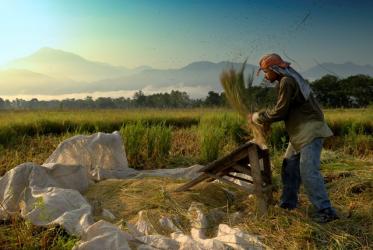Displaying 161 - 178 of 178
Faith at AIDS 2016: WCC preparing for faith in action
10 March 2016
Tveit on the “Ten Commandments” of food
26 January 2016
New video presents Ecumenical Advocacy Alliance’s call to action
13 January 2016
Consultation considers right to food in context of climate change
15 December 2015
Action Alert: AIDS 2016 - Applications open for interfaith chaplains
11 December 2015
COP21: how climate change affects access to our daily bread
09 December 2015
No place for hunger in a world of abundance
02 October 2015
Everyone urged to join Zero Hunger Challenge
29 June 2015
WCC considers AIDS report a “valuable tool”
26 June 2015











